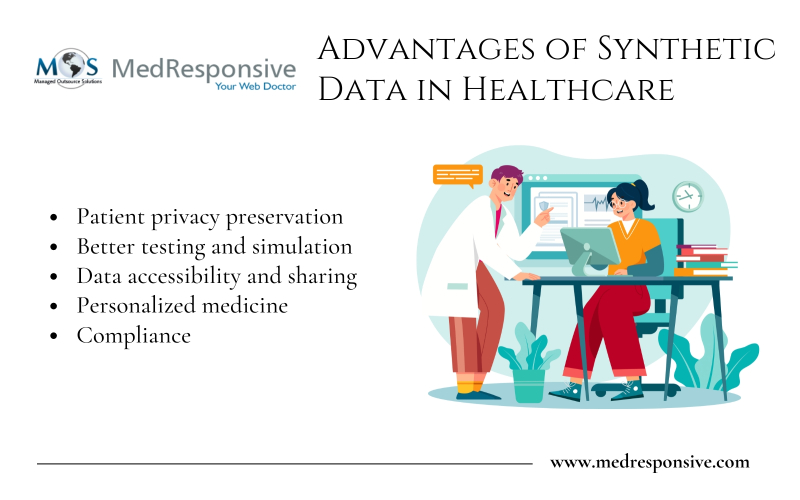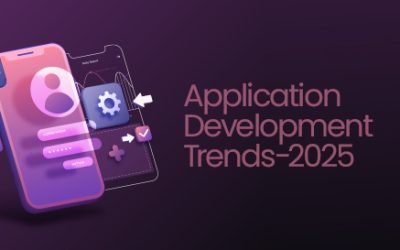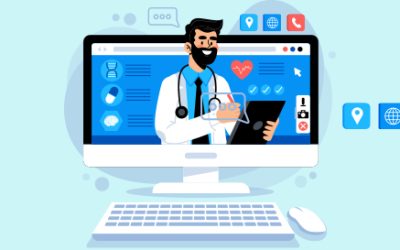Medical patient records hold utmost importance in the modern healthcare sector, as the exponential growth of advanced medical technologies generates vast amounts of health datasets. This information holds great potential to advance healthcare outcomes through innovations in clinical research, public health, or the development of new treatments.
However, healthcare data utilization challenges due to the constraints of healthcare regulations and patient privacy concerns hinder access to clinical information. In the coming years, synthetic data will likely become an essential tool for improving healthcare delivery, enhancing research, and ultimately saving lives. Healthcare entities can streamline their clinical procedures, research processes and other medical activities by outsourcing to EHR services for synthetic dataset generation.
The Role of Synthetic Data in Healthcare
Synthetic data, also known as simulated data in healthcare is the artificial recreation of the patient health dataset using AI and machine learning algorithms while maintaining the statistical properties of the source dataset. It is an optimal patient representative sample intended to simulate the structure and distribution of real-world medical information from sources such as electronic health records, medical images, or clinical trials.
The main goal of synthesized data in healthcare is to provide a safe, scalable, and ethical way to use health information for research, algorithm training, and drug development, without exposing sensitive patient information. As they are not specific to real patients, it offers a safe way to work with medical information while safeguarding patient confidentiality and privacy.
Use Cases of Synthetic Data in Healthcare
Although the use of synthetic datasets in healthcare is relatively new, the various applications of it are extensive and can be used in broad areas, such as:
- Research and development – Health institutions and academic medical practices can utilize simulated data to study and develop new medicines, analyze medical information, and classify complex diseases. It can accelerate research processes such as project feasibility studies, test hypotheses, and predict patient responses for research professionals.
- Algorithm training and testing – A wide access to high-utility datasets improves results for researchers using deep learning and machine learning algorithms by training on diverse synthetic datasets. It allows health systems to detect rare diseases, study epidemiological phenomena, and simulate clinical trials for enhancing health outcomes.
- Medical education and training – Synthesized datasets can be utilized to teach and train students and emerging young professionals in the medical field without compromising on patient privacy. It enables trainees to practice procedures, diagnostics, and treat simulated patients for improving their knowledge and skills for actual patient encounters.
- Healthcare Analytics – Simulated datasets can be used to model healthcare systems, predict outcomes, and test health policies, without compromising patient confidentiality or health information access limitations.
Benefits of Synthetic Data in Healthcare
Medical facilities, health leaders, and researchers can leverage simulated data for evidence-driven approach to healthcare research and development without exposing PHI. It has several advantages such as:
- Patient Privacy Preservation
The primary benefit of synthetic data is the ability to protect sensitive patient information as the synthetic profiles replicate the complexities and variability of real-world information without exposing PHI. Healthcare privacy regulations place strict rules on how patient data is handled and simulated data provides a workaround to these privacy concerns. Since the simulated dataset is mixed with fake information from actual patient records, it removes the risk of identifying individuals, allowing organizations to share the datasets freely for research or model-informed drug development without breaching privacy laws.
- Better Testing and Simulation
Healthcare systems, predictive models, diagnostic tools, and AI algorithms need to be rigorously tested before they can be deployed in real-world settings. Synthetic data offers a safe environment for researchers to test these tools and models in a safe, scalable way without risking patient safety or violating privacy. These datasets can be designed to cover a wide variety of scenarios, diseases, or treatment outcomes that may not be present in real-world datasets, enhancing research into new medical treatments or technologies.
- Data Accessibility and Sharing
Access to high-quality, comprehensive healthcare datasets is often limited due to privacy regulations or data aggregation challenges. Synthetic datasets help researchers and institutions to share, access, and find insights while protecting individual identities. This expanded information access can accelerate medical discoveries, improve disease understanding, and help design robust healthcare interventions.
- Personalized Medicine
Synthetic data can be used to generate patient-specific datasets, which are crucial for developing personalized medicine approaches. By creating simulated datasets that represent the unique genetic, clinical, and lifestyle factors of an individual patient, researchers can better predict how that person might respond to a particular treatment, medication, or intervention. Simulated datasets can also be tailored to include diverse populations or simulate rare conditions that may not be present in typical real-world datasets. This helps mitigate bias and ensures AI and machine learning models are more generalizable across different patient groups.
- Compliance
The healthcare industry is highly regulated with stringent rules and standards, accessing medical information is a time- and resource- laden process. Synthesized datasets offer an attractive alternative for better data utility and access as they do not reflect any personal identifiers of patients. By eliminating the usage of real patient information, medical professionals can facilitate research, device testing, and various public health initiatives without violating legal and ethical regulations.
Key Challenges of Synthetic Data in Healthcare
As synthetic data is still in its early stage of development and implementation, it comes with certain limitations, such as:
- Lack of Standards and Guidelines – There is currently no universal standard for generating or using artificial data, particularly in a regulated industry such as healthcare. Without standardized practices, the quality, reliability, and transparency of synthetic datasets can vary widely. Different organizations might use varying methods for generating simulated health datasets, leading to discrepancies in quality and making it difficult to integrate datasets across systems or institutions.
- Validation – It is essential to validate simulated data against real-world datasets to ensure it accurately reflects the complexity and variability of actual healthcare information. Validation is often difficult because a synthetic dataset, by nature, doesn’t correspond to any specific real patient records, making it challenging to assess its true performance.
- Model Generalization – If AI or machine learning models are only trained on simulated datasets, there’s a risk they may overfit to the artificial patterns within that dataset and fail to match authentic observations.
Looking Ahead: The Future of Synthetic Data in Healthcare
As patient privacy concerns continue to grow and healthcare systems embrace more AI-driven innovations, simulated data may become more sophisticated and widely adopted into everyday healthcare applications. It presents a promising solution for various matters in the medical field, such as clinical trials, medical research, and drug development. Since a simulated dataset shares only statistical properties with real records, healthcare providers and researchers can unlock new possibilities without compromising patient security. Healthcare organizations can protect patient privacy and comply with applicable regulations by outsourcing to medical application development services to synthesize safe medical datasets for their practices.





